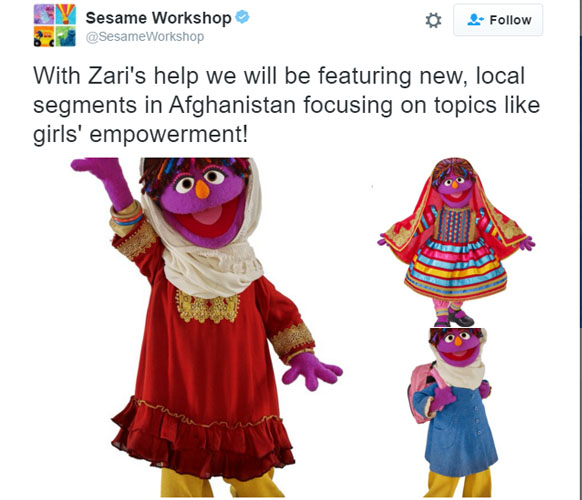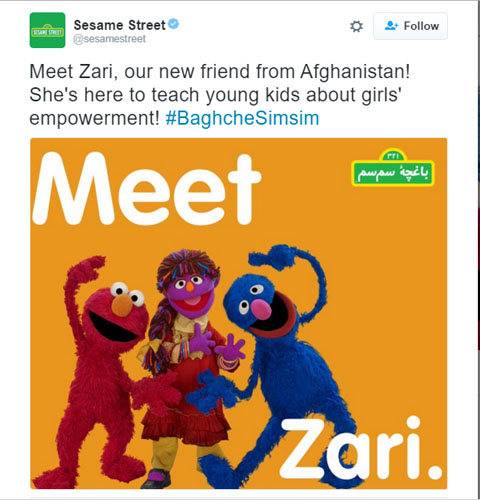Zari, the curious and lively muppet whose name means "shimmering" in the Dari and Pashto languages made her her debut on "Baghch-e-Simsim," a show funded by the US department of State,for per-schoolers in the Afghan version of the show, on April 7.
She featured in "Sesame Street" segments about health, exercise and well-being, and interviewed a doctor and other professionals to find out what she would need to do to become one herself.
"The exciting part about Zari is that she is modeling for young girls that it is wonderful to go to school and that it's ok to dream about having a career," Sherrie Westin, Sesame Workshop's executive vice president of global impact and philanthropy, told Reuters.
Zari will adorn clothes ranging from casual to traditional and will be veiled where appropriate. Her costumes incorporate fabrics and designs from all Afghanistan's ethnic groups - predominantly Pashtoon, Tajik, Uzbek and Hazara.
"Zari is a female because in Afghanistan we thought it was really important to emphasize the fact that a little girl could do as much as everybody else," Clemence Quint, program manager for Lapis Communications, the Afghan partner of the Sesame Street Workshop told AP.
Women and girls rights have been violated indiscriminately in Afghanistan. But over the years there has been a significant change in the mindset of people. The Sesame street TV show has not only attracted children but has also opened the minds of Afghan fathers about the value of educating their daughters.
The newly crafted character follows female muppets like Chamki in India and Kami in South Africa who play a key role in "Sesame Street" co-productions.
Afghanistan has been at war for almost 40 years, since the 1979 Soviet invasion and the subsequent mujahedeen war that lasted a decade. That was followed by a devastating civil war, in which warlords drew lines based on their ethnicity and killed tens of thousands of people in Kabul alone.
The Taliban took over in 1996, and their five year rule was one of brutal extremism in which they banned women from work and girls from going to school, confining them to their homes. The radical Taliban regime was forced from power by the 2001 U.S. invasion that ushered in a democratic experiment and billions of dollars in international aid to rebuild the country.
Part of that project was the creation of a vibrant Afghan media sector, as well as repairing the education system and getting girls back to school alongside boys. The number of children in school grew from 900,000 in 2001 to 8.3 million in 2011, according to figures from the U.N. assistance mission to Afghanistan. UNAMA says girls account for 39 percent of the total - up from near zero under the Taliban.
However, Afghanistan is still an impoverished country, with only 60 percent of its children in primary or lower secondary schooling, according to a January report by UNICEF on children living in conflict zones.
-India Today








